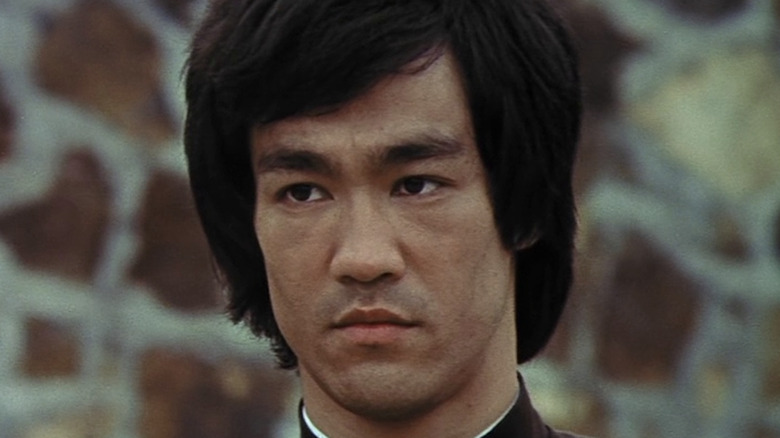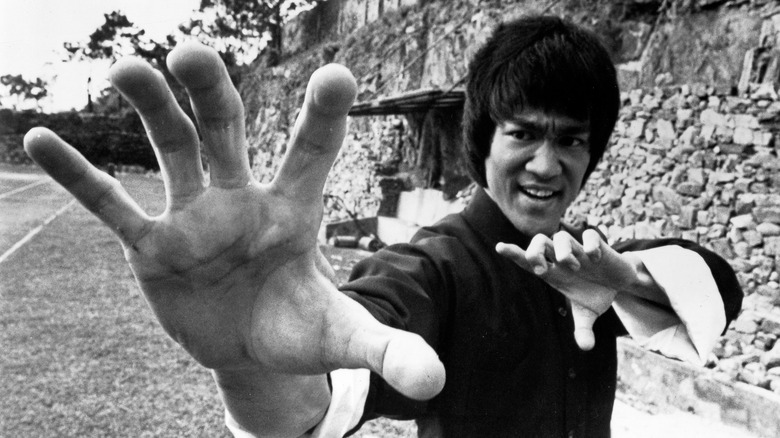Bruce Lee's Possible Cause Of Death Unveiled In Bombshell Study
We may receive a commission on purchases made from links.
The sudden death of action star Bruce Lee on July 20, 1973 in Hong Kong has stoked dozens of questions and schools of thought in the decades that have ensued. Speculation from fans, colleagues, and biographers has resulted in a cloudy public picture as to what really felled the seemingly-healthy legend. Snopes records a 2018 example of such speculation put forth in a biography by author Matthew Polly that suggests the actor's lack of sweat glands may have contributed to his death by heat stroke. That's just one of many rumors about Lee's death that have been bandied about in the nearly five decades since he lost his life, which have included everything from foul play to steroid abuse (per Reelz Channel's podcast for their program "Autopsy: The Last Hours of Bruce Lee").
The official cause of Lee's passing, per Variety, was listed by officials in Hong Kong as cerebral oedema, swelling of the brain. But a new group of researchers has entered the debate to cast even more doubt on the official report. This group of medical specialists has joined together to posit a fresh theory about Lee's dying days which adds an entirely new wrinkle to what might have been behind his death. The revelation is quite a stunner after years of doubt, speculation, and concern about how and why someone who seemed so healthy and so tough could die out of the blue at such a young age.
Spanish researchers suggest Lee may have overdosed on water
A report published by a group of Spanish kidney researchers in the December 2022 issue of the Clinical Kidney Journal suggests that Bruce Lee may have died from hyponatraemia — his body lacked critical levels of salt due to his heavy water intake. The end result was that his kidneys were unable to process the heavy amount of fluids he consumed on a daily basis. With his organs being unable to excrete the high amount of water in his body, hyponatraemia set in, followed by cerebral odema, ultimately resulting in his swift death.
The paper includes a laundry list of contributing factors related to this conclusion, including prescription drug usage, marijuana consumption (which may cause users to become thirsty and encourage even more water consumption), and previous organ injuries. "We hypothesize that Bruce Lee died from a specific form of kidney dysfunction: the inability to excrete enough water to maintain water homeostasis ... This may lead to hyponatraemia, cerebral oedema and death within hours if excess water intake is not matched by water excretion in urine," the paper's conclusion reads in part. The researchers add that hyponatraemia is often found in 40% of hospitalized persons and might contribute to the deaths of even the young and the healthy. This also supports the researcher's belief that more consumers should be aware of the dangers of excessive fluid intake.
Naturally, this conclusion is only a medial hypothesis, and may or may not be contradicted with time and further study. Per Fox News, Lee's family has not responded to requests for a comment on these new findings.
A previous collapse may be a factor in Lee's death
As previously stated, the 2018 biography "Bruce Lee: A Life" also hypothesized that Bruce Lee's overconsumption of water may have been a contributing factor in his abrupt death. Author Matthew Polly told Fox News that a previous medical problem may have been yet another factor in the actor's passing.
"The key to understanding Bruce Lee's death is that he collapsed 10 weeks before and almost died of the very same thing," Polly explained to the news outlet. "On May 10, 1973, he walked into a small dubbing room on one of the hottest days of the month. They turned off the air conditioner to avoid ruining the soundtrack." Lee overheated and subsequently collapsed outside of the recording room. He recovered, but once he returned to the booth began to experience convulsions after collapsing once again. Lee was taken to the hospital and, while brain swelling was suspected by the doctors in charge of his care, Lee's ailment was written off as being a minor case of heat stroke. But Polly believes that Lee's untreated heatstroke was so severe it ultimately lead to his death, abetted by the removal of the sweat glands beneath his underarms.
Lee's widow, Linda Lee Cadwell, maintained in a 1998 article response published in the Los Angeles Times that she believes her husband's consumption of the painkiller which included an ingredient Lee was sensitive to lies behind his passing. "Bruce died from cerebral edema caused by hypersensitivity to an ingredient in a prescription medication called Equagesic. This determination was made after an exhaustive, nine-day coroner's inquest during which the testimony of forensic pathologists from all over the world, who had studied every tissue in Bruce's body, was heard," said Cadwell.


